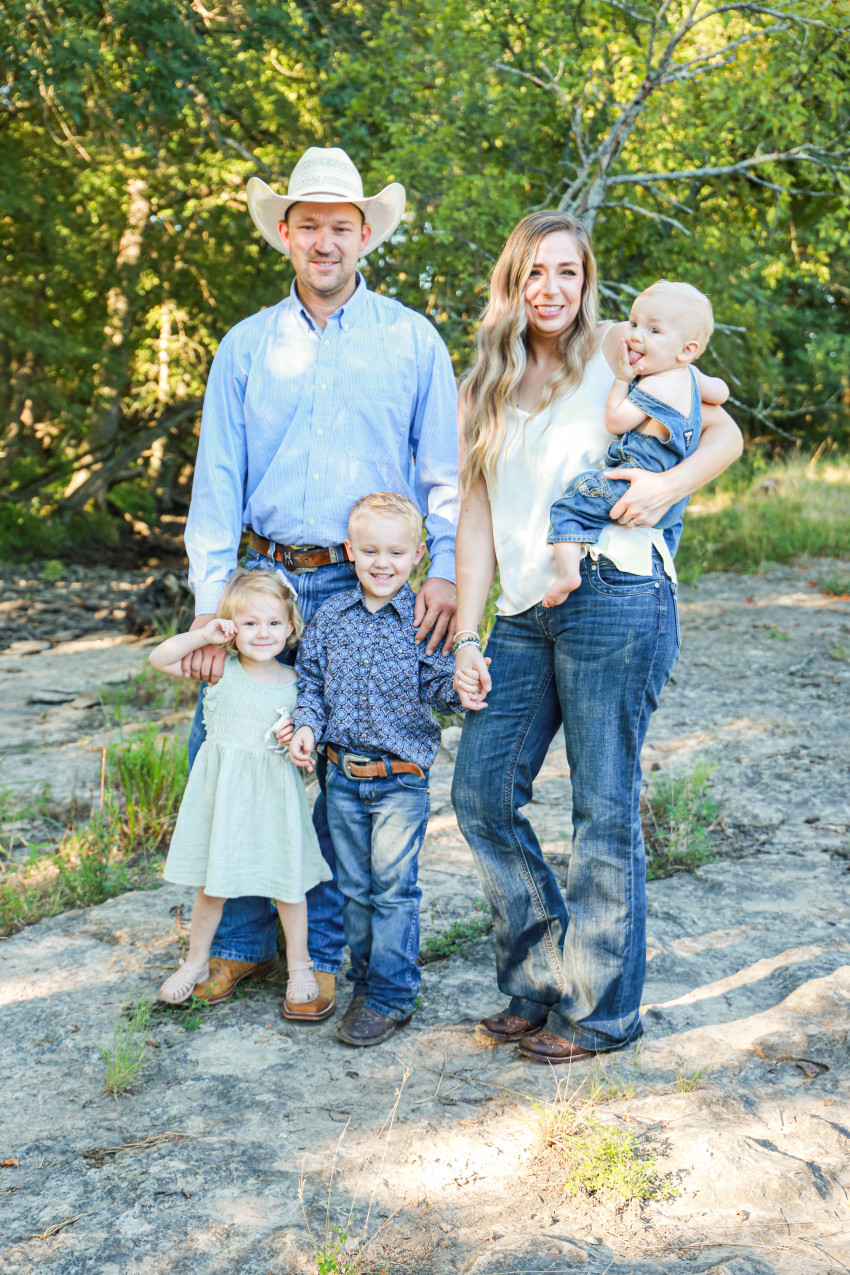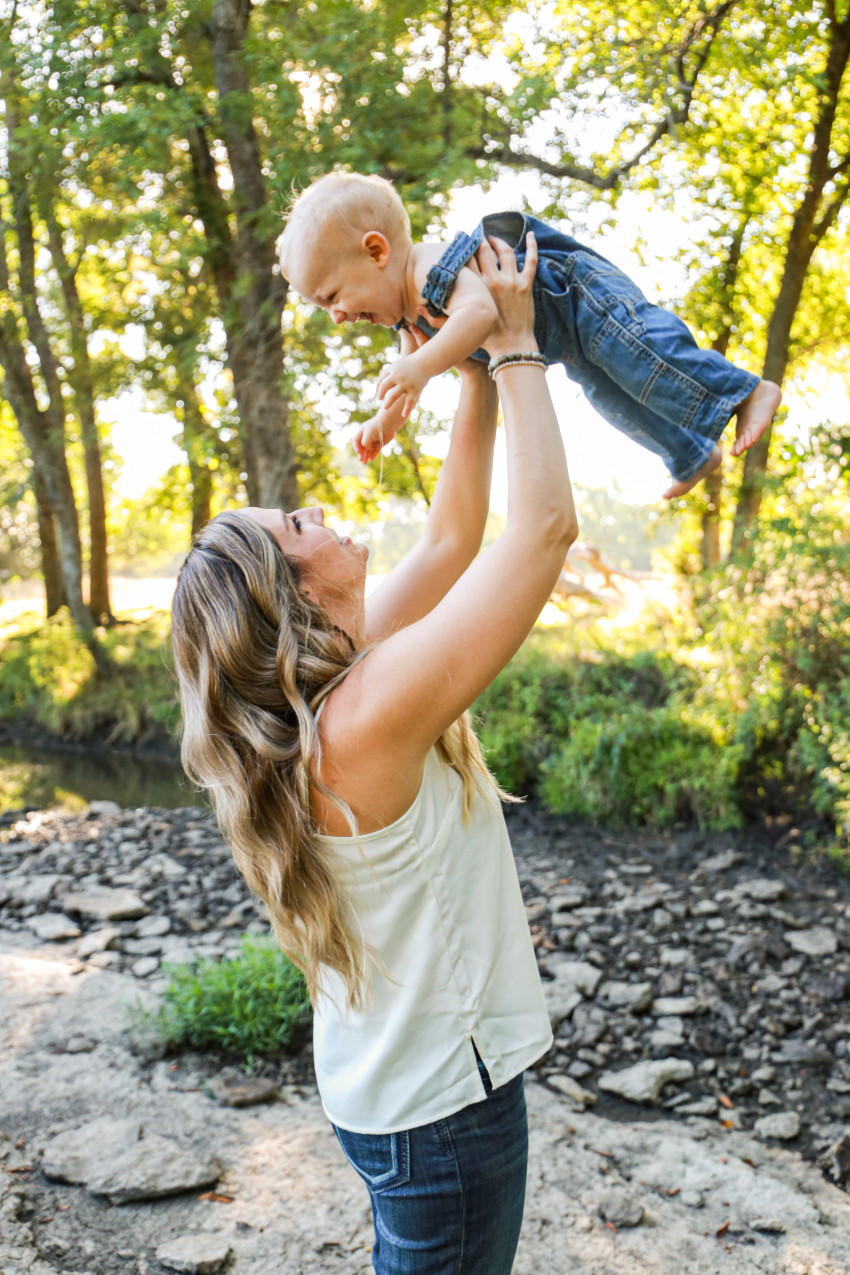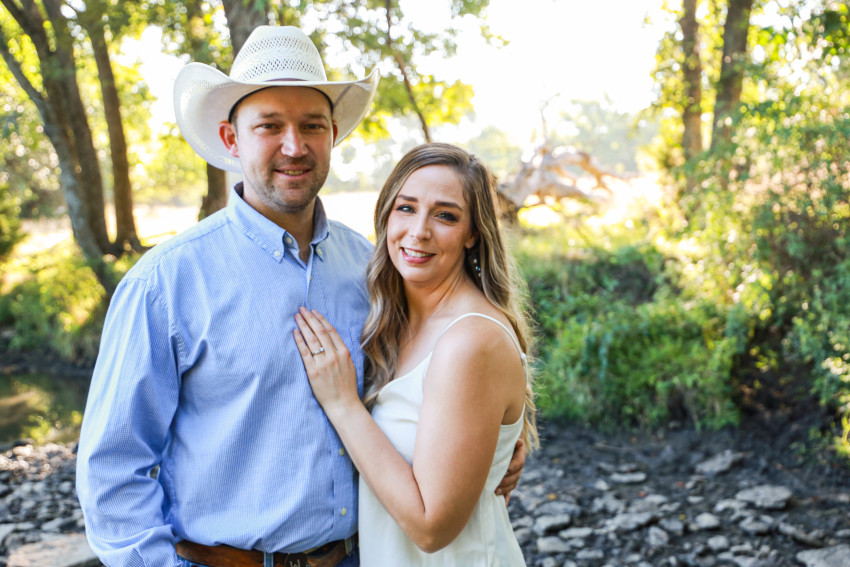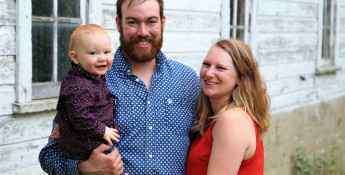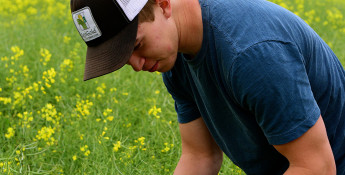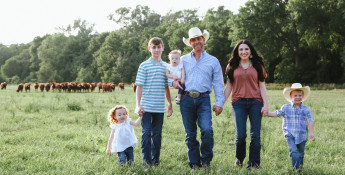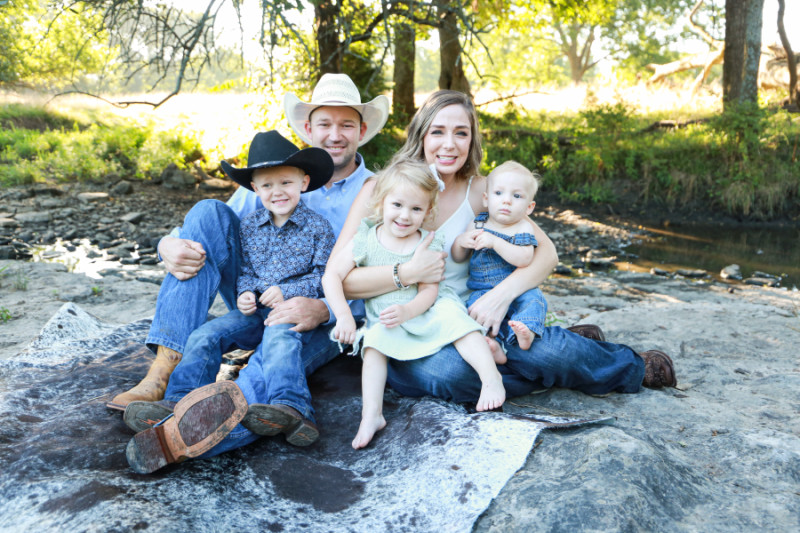By Kansas Living on August 2, 2023
Meet the Wray Ranch Family
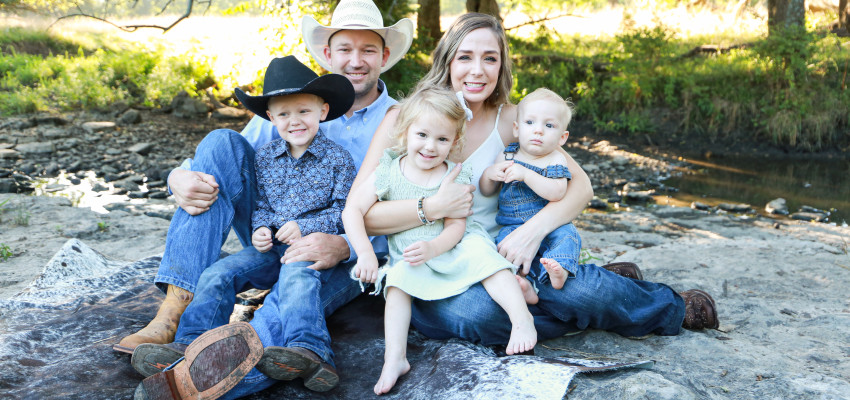
Mark and Lacey Wray are ranchers in Kansas who love what they do and hope to pass their legacy on to their children. Learn more about his ranch family.
Our operation, Wray Cattle and Grain LLC, is in Ottawa. Mark and I have three kids, Sage, Sadie and Owen. We work in partnership with Mark’s parents, John and Brenda, who started the farm in the 1990s with Mark’s grandpa, Jack. Mark’s younger sister, Amanda, came back to the farm after graduating from Kansas State University in December and has brought new perspectives and ideas.
Wray Cattle and Grain is a diversified operation consisting of row crops and cattle. On the crop side, we grow corn, soybeans, wheat and forage sorghum on no-till acres. We have a herd of spring and fall cows. We also graze and background yearlings. We own two horses and a pony named Rascal who lives up to his name every day. We also have a flock of backyard laying hens, and we love them! The egg deliveries to our neighbors are a weekly highlight for our kids.
What three things matter the most to you as a rancher?
Family. We both grew up on a family farm and ranch, and we hope to pass on the same lifestyle to our kids. Although our children are still very small, we try to involve them as much as we safely can. We both have the most amazing memories of a childhood spent in agriculture — founded on hard work and big love — and wouldn’t have it any other way for our kids.
Integrity. One thing most agriculturists have in common is our desire to do things right. My dad always told me we did things the way we did so we could “leave it better than it was when we got it.” We utilize conservation practices in our crop production so we can improve the soil and maintain the land.
Sustainability. Integrity and sustainability go hand in hand in so many ways. When you operate in a way that takes care of your livestock and land, you often improve your ability to be more productive with less. We hope to pass on our operation to the next generation one day, and to do so, we find it important to diversify and search for ways to do things better.
What does sustainability mean to you?
Sustainability is managing our farm the right way so we can preserve our resources and our way of life for future generations. We’re extremely proud to practice no-till farming on all our acres and have done so for around 25 years. Cover crops also help us be better stewards of our soil resources to prevent erosion and nutrient loss. Advancements in technology allow us to use soil sampling for a nutrient plan best suited to our land and GPS to help us increase production without added labor or inputs. Agriculture as an industry is constantly striving toward greater sustainability, and we see the value in these practices in our own operation.
What are you typically doing during fall on your farm/ranch?
The big show in fall is harvest! Fall is easily the busiest season for us. We usually start in late August with corn harvest, and when that wraps up, we drill wheat acres. Our fall cows start to calve in mid-September, so while we’re in the field, we’re also trying to check on them at least twice a day to make sure the calves are coming without problems and everyone is healthy. Soybean harvest usually starts in October and goes through November. It’s always a crazy busy time, but harvest signals the end of another long and hard, but (hopefully) rewarding and high-yielding year. We always look forward to the last calf birth and the last combine dump after working so hard for several months.
What is your favorite way to prepare beef?
In an ideal world, we’d have medium-rare prime rib roast on our table every night of the week! I’m sure we would start to have a lot more dinner guests too! However, we tend to lean an awful lot toward dishes from south of the border. We have a lot of tacos, burritos and enchiladas. I really love to use our Crock-Pot at this busy stage of life. Chili in the Crock-Pot is a big fall-time favorite! There’s nothing better than coming home after a soccer game on a cool day to chili and some cinnamon rolls.
What is one thing you wish consumers knew about your operation?
We care. We care so much about the well-being of our cattle and always hope to keep them as healthy and thriving as possible with minimal intervention. Our desire is for our baby calves to come into the world strong and spunky, and to spend every day eating until they’re full and enjoying life. We care about how the fertilizer we use affects our soil and water, as well as the soils and waters down the road. We want your food and ours as well to be plentiful, safe, healthy, sustainable and affordable for generations to come.
Where do you see the future of your operation going?
We are always looking for ways to improve. I hope in the years to come, we advance with technology and really hone in our crop production with fewer and fewer resources. The cost of everything is rising, so soon we won’t have a choice but to be more prudent than ever with seed and chemical. We are always hoping to expand acres, but in our part of the country, farming acres are only shrinking more and more. Regardless, we always look for ways to either add acres or make the ones we currently farm more productive. As far as the cattle side of things, we have discussed the disbursement of our spring cow herd and focusing more on our fall cows and our yearlings and feeders. We truly hope we will be able to pass our farm and ranch to our own kids. That has always been our greatest desire and only time will tell if their passions will lie in agriculture as well.
The farming and ranching lifestyle is not for the faint of heart, and no matter what they choose to do in life, we hope they will take the lessons they learn on the farm and a fierce heart with them wherever they go.
What is the hardest and best part of your job as a rancher?
Not ever having a schedule is the largest blessing and worst frustration all at the same time! There is such a freedom in being able to just tackle tasks as they come at you, and to be able to choose what your priorities are for the day as the sun rises. But that also makes life hard to manage at times. It is hard to know what will need to be done at any certain time and to commit to non-farm events and responsibilities. The life of a farmer and rancher is one requiring flexibility and a strength in solving problems on the fly. Weather changes, cattle get out, horses get hurt, and crops don’t yield, and it all seems to happen when you least expect it. All of this means we have to work together as a family to make sure all of the farm tasks are checked off and each family member is taken care of. No one person solely focuses on one piece of the puzzle. Instead, we all try to jump in where we need to so we can make sure things get done.
What does a typical day/week/month look like for you?
Honestly, it always changes! We are never ever bored. Every single day, week and year brings something different. The tasks always change, the challenges are constantly moving, the world is always turning and farmers and ranchers have to change with it. The one thing we can count on is the livestock will be fed and the crops will be planted. What happens in between is always variable.
What is one thing you've changed on your operation since you started?
As with any productive operation, we are on the search for constant improvements. One of the best changes we have made to our farm over the years has been improving our cattle handling facilities, including a new processing barn with a hydraulic chute and adding an onsite grow yard. On our farm, we see a large advantage to being able to do most everything ourselves instead of outsourcing labor. To do so, we have acquired semis and livestock pot trailers to be able to move our cattle in a cost and time effective manner. Another improvement to our cattle operation that we do ourselves has been artificial insemination (AI) and pregnancy diagnosis. Mark AIs and pregnancy checks all of our cows, which has proved to be very beneficial. We have been able to fine tune our breeding program and do not have to depend on others to accomplish this.
What would you do if you weren't a rancher?
Mark: I would be a veterinarian, but I can’t say if I would be more or less stressed as I am now. Since coming back to the farm, I have worked really hard to become competent in animal health and treatment. There isn’t a lot I can’t confidently tackle at this point. I’ve truly seen a lot of things and had to solve a lot of problems and I feel fairly proficient in my ability to do a lot of the complicated things involved in raising livestock. The one thing I haven’t done on my own is a c-section on a cow, but I feel like we could get it done if the need ever arises.

